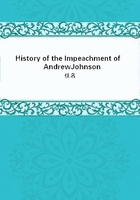
第45章 IMPEACHMENT REPORTED TO THE SENATE.(4)
That said Andrew Johnson, President of the United States. on the twenty-second day of February, in the year of our Lord one thousand eight hundred and sixty-eight, at Washington, in the District of Columbia. in disregard of the Constitution, and the laws of the United States duly enacted, as commander-in-chief of the army of the United States, dial bring before himself then and there William H. Emory, a major-general by brevet in the army of the United States, actually in command of the department of Washington and the military forces thereof, and did then and there, as such commander-in-chief, declare to and instruct said Emory that part of a law of the United states, passed March second, eighteen hundred and sixty-seven entitled "An act making appropriations for the support of the army for the year ending June thirtieth, eighteen hundred and sixty-eight and for other purposes," especially the second section thereof, which provides, among other things, that "all orders and instructions relating to military operations. issued by the President or Secretary of War, shall be issued through the General of the army, and, in case of his inability, through the next in rank," was unconstitutional, and in contravention of the commission of said Emory, and which said provision of law had been theretofore duly and legally promulgated by General Orders for the government and direction of the army of the United States, as the said Andrew Johnson then and there well knew. with intent thereby to induce said Emory, in his official capacity as commander of the department of Washington, to violate the provisions of said act, and to take and receive, act upon, and obey such orders as he, the said Andrew Johnson, might make and give, and which should not be issued through the General of the army of the United States, according to the provisions of said act, and with the further intent thereby to enable him, the said Andrew Johnson, to prevent the execution of the act entitled "An act regulating the tenure of certain civil offices," passed March second eighteen hundred and sixty-seven and to unlawfully prevent Edwin M. Stanton then being Secretary for the Department of War, from holding said office and discharging the duties thereof, whereby said Andrew Johnson, President of the United States, did then and there commit and was guilty of a high misdemeanor in office.
And the House of Representatives by protestation saving to themselves the liberty of exhibiting at any time hereafter any further articles, or other accusation or impeachment against the said Andrew Johnson, President or the United States, and also of replying to his answers which he shall wake unto the articles herein preferred against him, and of offering proof to the same, and every part thereof, and to all and every other article, accusation, or impeachment which shall be exhibited by them, as the case shall require, do demand that the said Andrew Johnson may be put to answer the high crimes and misdemeanors in office herein charged against him, and that such proceedings, examinations, trials, and judgments may be thereupon had and given as may be agreeable to law and justiceARTICLE X.
That said Andrew Johnson, President of the United States, unmindful of the high duties of his office, and the dignity and proprieties thereof, and of the harmony and courtesies which ought to exist and be maintained between the executive and legislative branches of the government of the United States, designing and intending to set aside the rightful authority and powers of Congress, did attempt to bring into disgrace, ridicule, hatred, contempt and reproach, the Congress of the United States, and the several branches thereof, to impair and destroy the regard and respect of all the good people of the United States for the Congress and legislative powers thereof, (which all officers of the government ought inviolably to preserve and maintain.) and to excite the odium and resentment of all the good people of the United States against Congress and the laws by it duly and constitutionally enacted; and in pursuance of his said design and intent, openly and publicly, and before divers assemblages of the citizens of the United States, convened in divers parts thereof to meet and receive said Andrew Johnson as the Chief Magistrate of the United States, did, on the eighteenth day of August, in the year of our Lord one thousand eight hundred and sixty-six, and on divers other days and times, as well before as afterward, make and deliver, with a loud voice, certain intemperate, inflammatory, and scandalous harangues, and did therein utter loud threats and bitter menaces. as well against Congress as the laws of the United States duly enacted thereby, amid the cries, jeer, and laughter of the multitudes then assembled and in hearing.
ARTICLE XI.